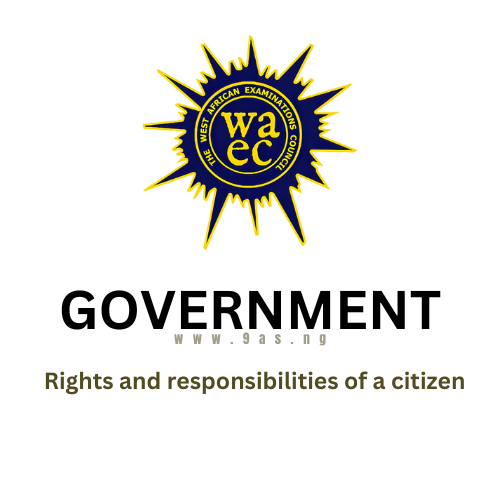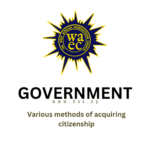THEORY
1. Why do citizens obey the laws of the state?
2. Explain the term Fundamental Human Rights.
3. Why is Fundamental Human Rights entrenched in a
constitution?
4. Explain six ways by which a citizen’s right can be safeguarded.
5. Under what circumstances can the rights of the Individual be restricted?
6. Outline any three fundamental human rights of a citizen.
7. What are the limitations of these rights?
8. Define the rights of a citizen
9. Highlight five ways of safeguarding the rights of a citizen in a state.
10. Define Fundamental Human Rights.
11. Highlight five means of safeguarding Fundamental Human Rights in a State
12. Highlight any six ways by which the rights of a citizen can be protected
13. What are rights?
14. Highlight four limitations on the rights of a citizen.
15. Outline four responsibilities of a citizen to the state
16. Explain five ways of safeguarding rights of citizens.
17. Identify five reasons for which citizens lose trust in the government.
OBJECTIVES
1. A good citizen must be
A. an educated and honest tax payer.
B. ready to assist law enforcement agents.
C. wealthy and ready to save his country.
D. educated and obedient to the law.
2. A major reason for enshrining fundamental human rights in the constitution is to
A. make the constitution flexible.
B. make the constitution supreme.
C. protect the rights of office holders.
D. protect the rights of individuals in the society.
3. One of the limitations on freedom of speech is
A. libel.
B. trespassing.
C. bye-laws.
D. unlawful detention.
4. A citizen’s duties do not include
A. defending the nation.
B. obeying the laws.
C. paying taxes.
D. giving alms to the poor.
5. Freedom of speech is a fundamental human right enjoyed by citizens but it may be limited if
A. loyalty is not shown to the ruling party.
B. it exposes the wrong-doings of the government.
C. it endangers the security of the state.
D. it is used to cause embarrassment to the judiciary.
6. Which of the following is an obligation of a citizen?
A. Attending political rallies.
B. Taking part in Independence Day celebration.
C. Contesting elections.
D. Paying respect to the national flag.
7. Which of the following is not a duty of a citizen?
A. Obedience to the laws.
B. .Payment of taxes.
C. Service to the nation.
D. Giving alms to the poor.
8. Which of the following is not a civil obligation of a citizen?
A. Obedience to law.
B. Payment of taxes.
C. Voting during elections.
D. Freedom of conscience and religion.
9. Fundamental Human Rights seek to
A. Promote the dignity of man.
B. train political activists.
C. encourage economic activities.
D. enthrone mob rule.
10. An order directing a detainee to be brought before the court is called
A. habeas corpus.
B. appearance.
C. an injunction.
D. a referendum.
11. Which of the following is a duty of a good citizen?
A. Paying tax regularly.
B. Must assist the poor.
C. Should challenge the law of the land.
D. Must join the law enforcement agents.
12. Citizens can be deprived of their rights during
A. democratic regime.
B. parliamentary debate. C. emergency periods. D. political campaigns.
13. Which of the following is an obligation of a citizen?
A. Arresting offenders.
B. Voting at elections.
C. Prosecuting offenders.
D. Adjudicating cases.
14. A citizen’s right to expression can be limited if he .
A. pays taxes when due.
B. serves as witness in court.
C. commits slander, libel or sedition.
D. fails to vote during elections.
15. The privilege citizens enjoy in a country irrespective of sex, tribe or creed is
A. right.
B. constitution.
C. manifesto.
D. franchise.
16. The most important duty of every citizen is to
A. discharge his civic responsibilities to the state.
B. obey traditional authorities. C. recite the national anthem.
D. participate in government programmes.
17. The rights of the individual are the
A. demands he can make on the state.
B. claims he can make against others.
C. claims the law allows him to make against the state.
D. claims those in government are willing to entertain.
18. The judicial order requiring a detained person to be brought before a judge is the right of
A. Habeas corpus.
B. Mandamus.
C. Prohibition.
D. Certiorari.
19. Which of the following protect the rights of the individual in a state?
A. The police and the soldiers.
B. The executive and legislature.
C. The police and the courts.
D. The lawmakers and lawyers.
20. The concept of social justice implies
A. fairness to all citizens.
B. freedom for every citizen.
C. equality of citizens.
D. security for all citizens.
21. Freedom of association is important because
A. it allows for the formation of interest groups and organizations.
B. it is the same thing as freedom of movement.
C. membership is compulsory.
D. association aid the government.
22. Fundamental Human Rights can be defined as
A. freedoms enshrined in the constitution.
B. the provisions of the constitution of the ruling political party.
C. the provisions of the local government constitution.
D. regulations about workers’ welfare.
23. One duty of a good citizen is
A. building schools and hospitals.
B. respect of the dignity and the rights of others.
C. loyalty to other nations.
D. defending a suspect.
24. Government protects the lives and property of the citizens of a state through the
A. courts and the police.
B. legislature and prisons.
C. ministers and the police.
D. customs and the police.
25. In Nigeria the institution that preserves civil liberty is the
A. Judicial Service Commission.
B. Federal Electoral Commission.
C. Law Courts.
D. State Security Service.
26. The rights of citizens to benefit from public utility is classified as
A. social rights.
B. natural rights.
C. religious rights.
D. political rights.
27. Which of the following is a fundamental right? Right to
A. life.
B. education.
C. criticize government.
D. public office.
28. Fundamental human rights are entrenched in the Constitution of a state in order to
A. encourage unlimited freedom.
B. enable the courts to punish offenders.
C. restrict the liberty of citizens.
D. guarantee the liberty of citizens.
29. Obedience to the laws of the state is a part of one’s
A. duties.
B. rights.
C. privileges.
D. requirements.
30. Establishment of an independent judiciary is a way of safeguarding citizens’
A. rights.
B. obligations.
C. privileges.
D. education.
31. Slander limits a citizen’s freedom of
A. Expression.
B. Movement.
C. Association.
D. Religion.
32. It is not the duty or obligation of a citizen to
A. pay his tax.
B. defend his country in times of war.
C. arrest and prosecute offenders.
D. vote at elections.
33. The three basic fundamental rights of citizens are
A. salvation, property and freedom of thought.
B. life, liberty and property.
C. free movement, free education and free health care.
D. freedom of movement, speech and religion.
34. Fundamental Human Rights are entrenched in constitutions purposely to
A. ensure freedom of speech.
B. guarantee the liberty of citizens.
C. promote good governance.
D. promote trade.
35. Which of the following is not a fundamental human right?
A. Right to life.
B. Right to vote.
C. Freedom of movement.
D. Freedom of religion.
36. The order of mandamus is a
A. form of order by a superior body to perform a function.
B. mandate from the executive to the public corporations.
C. plea for man of alibi in court.
D. writ to produce a detained person for trial.
37. The rights of individuals are usually enshrined in the
A. law books.
B. courts.
C. constitutions.
D. journals.
38. Citizens can seek redress against injustice from the state through the
A. ombudsman.
B. head of civil service.
C. Civil Service Commission.
D. titular executive.
39. The office of the ombudsman is created to act as
A. spy for government.
B. an agency to redress maladministration.
C. regulator of government activities.
D. sole administrator of public corporations.
40. The Public Complaints Commission is empowered to De-investigate complaints and to
A. prosecute false complaints.
B. report findings to appropriate authorities.
C. reprimand authorities against whom complaints are made.
D. refer complaints to traditional rulers.
41. The Public Complaints Commission helps to promote all the following except
A. democracy.
B. the rule of law.
C. military dictatorship.
D. justice.
42. Public Complaints Commission in West African countries can be called
A. Civil Service Commission.
B. Ombudsman.
C. Local Authority Commission.
D. Ministry of Establishment.
43. The institution created for checking abuses by government department is known as the
A. secret service.
B. judicial commission.
C. ombudsman.
D. corps marshall.
44. People pay taxes in order to
A. generate revenue for government.
B. obtain a tax clearance certificate.
C. avoid being prosecuted in the courts.
D. save towards the future.
45. The main obligation of a citizen is
A. to register for election.
B. allegiance to the state.
C. to serve in the army.
D. the right to life.
46. Habeas Corpus implies
A. unlawful detention.
B. discrimination in public service.
C. indiscriminate party formation.
D. right to vote.
47. The rights to freedom of speech means that people are free to
A. express anything they like about government.
B. disobey the government of the day.
C. express opinion within the limits of the law.
D. participate in government.
48. The limitation on the right to life can be found
A. among the people.
B. in the case of a convicted person.
C. in the Executive.
D. in the Government.
49. Civil rights in a country are enjoyed by
A. citizens.
B. aliens.
C. prisoners.
D. refugees.
50. Freedom to act as one pleases but within the law is described as
A. democracy.
B. separation of powers.
C. human right.
D. civic responsibility.
51. An institution which seeks to redress people’s grievances against abuse of administrative power is
the
A. Ombudsman.
B. Judiciary.
C. Directorate of Public Prosecution.
D. Judicial Service Commission.
52. A citizen’s freedom of movement may be restrained if he
A. has refused to salute the Head of State.
B. has been convicted by the court.
C. refuses to vote at elections.
D. refuses to vote at elections.
53. The ultimate duty of a citizen is to demonstrate in his/her
A. allegiance to the sovereign
B. loyalty to the state
C. respect for the national flag
D. contribution to government expenditure
54. Which of the following is not an obligation of a citizen?
A. Payment of taxes.
B. Voting in an election
C. Protecting public property
D. Attending religious gathering
55. The right to respect the personality of the individual is a
A. civil right.
B. natural right.
C. social right.
D. economic right.
56. The following are redresses available at the courts for aggrieved people except
A. injunction.
B. mandamus.
C. certiorari.
D. prorogation.
57. Which of the following usually leads to the curtailment of the rights of citizens?
A. Transitional period.
B. Granting of presidential pardon
C. Period of constitutional reforms
D. Violent socio-political unrest.
58. The right to an adequate standard of living falls under
A. civil right.
B. economic right.
C. free market economy.
D. right to life.
59. Citizenship does not only go with rights but also the performance of
A. compulsory military service.
B. compulsory teaching.
C. certain obligations and duties.
D. certain religious rites.
60. The concept of social justice implies that state must ensure
A. sharing of political power with opponents
B. security for multi-national businesses
C. equality of citizens
D. fairness to foreign nationals
61. The basic human rights of citizens in a state are
A. freedom of movement, free education and free health
B. free social services, speech and religion
C. right to life, liberty and property
D. right to higher education, property and freedom of thought.
62. The Fundamental Human Rights and Liberties must be entrenched in a constitution to
A. make it difficult to tamper with
B. show concern for the people
C. serve majority interest
D. espouse love for the country
63. What type of right enables citizens to participate in state affairs?
A. Habeas corpus
B. Political right
C. Judicial right
D. Social right



